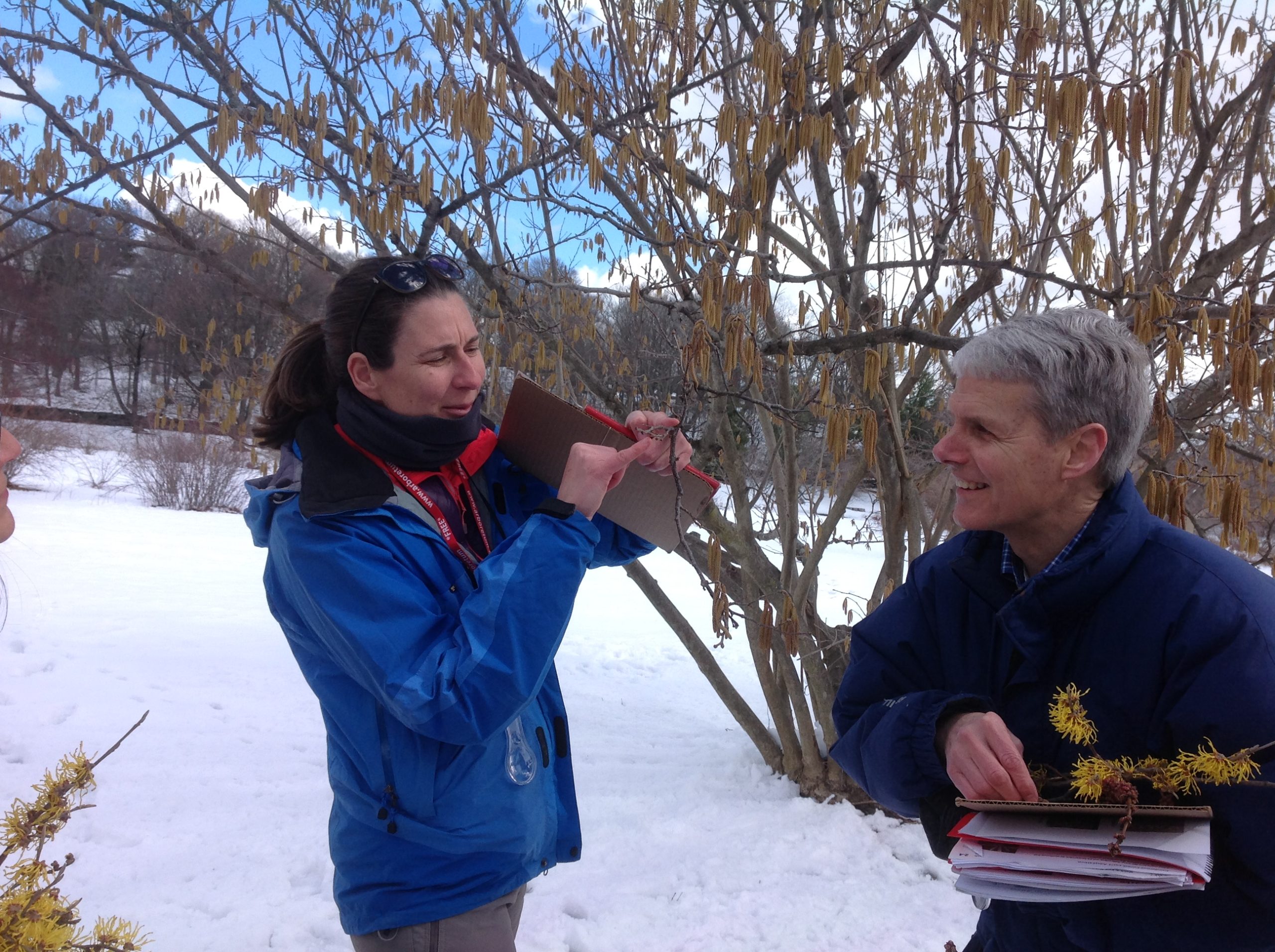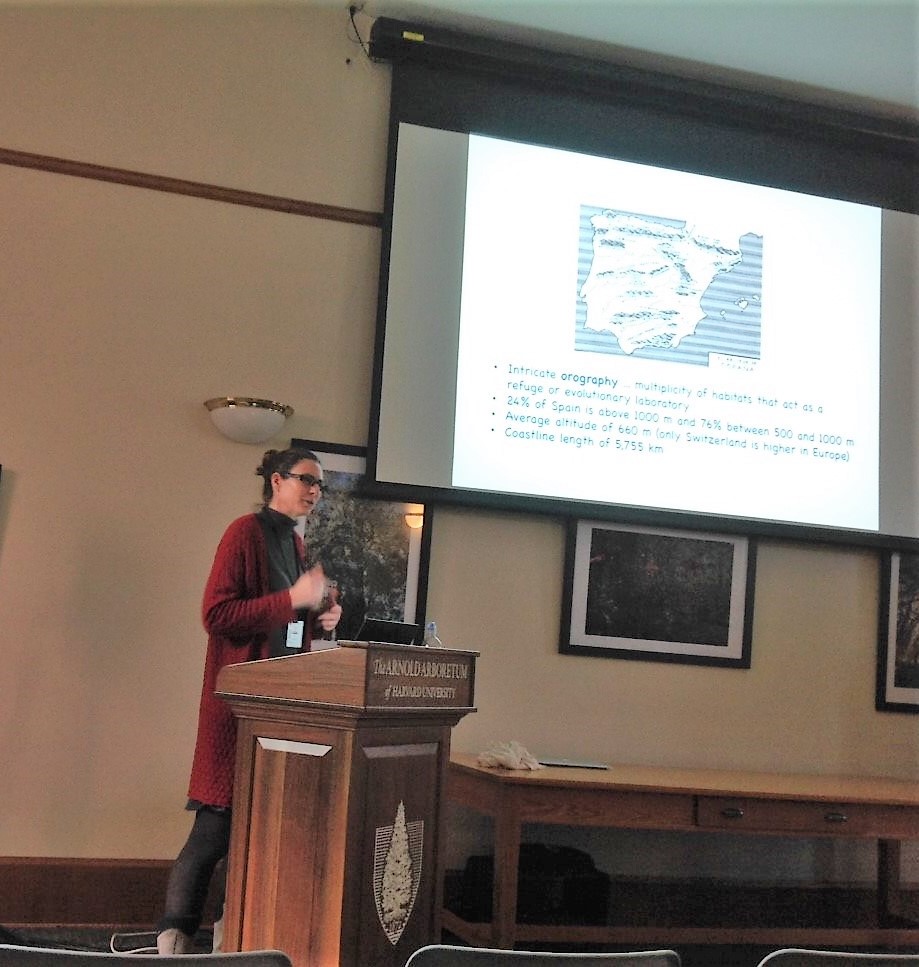
Recently, the Arnold Arboretum hosted a six week visit by Olga Mayoral, a professor from the Department of Experimental and Social Sciences (Faculty of Teacher Training) of the Universitat de València in Spain. She is also a researcher at the Botanic Garden of the Universitat de València. Olga’s stay in March and April 2018 was provided by the Short-Term Funded Visits of Real Colegio Complutense at Harvard University.
The purpose of Olga’s visit was to establish contact with the Arnold Arboretum of Harvard University through participation in public program activities and research talks. She also conducted a study within her ongoing topic of interest for research and publication: botanical gardens, arboreta, and outdoor environments as teaching and learning resources for various academic levels. Olga shared some of her impressions with us of her time at the Arboretum:
“During my stay I had the opportunity to get to know in detail the educational programs at the Arnold Arboretum and attend its various courses, lectures, workshops. I also had access to books and printed material not available at my University, connected with and observed elementary science teachers, and became familiar with the Massachusetts curriculum and standards for life science. Participating in Arboretum for Educators workshops gave me the opportunity to meet science teachers in the Boston area and visit some private and public schools where science educators use the outdoors for their science classes. Another interesting visit was to Boston Nature Center & Wildlife Sanctuary, where outdoor education is the norm across age groups. A special visit to the pre-school classes, where children spend around 80% of their day in nature, was especially satisfactory.

I’d like to focus on two programs in which I was immersed more deeply, programs that surprised me with the good practices and standards established by the people in charge of them. I could perceive the long-term goals that the organizers had developed, which had a direct effect on the commitment of the volunteers and teachers involved. The way these programs are organized ensure high quality standards and encourage the engagement of all. Participants feel as if they were a part of the Arboretum, which translates to important feelings of responsibility and pride.
Arboretum for Educators. This professional development program, ongoing throughout the academic year, gives teachers who are interested in including fieldwork in their natural science classes the essential tools and necessary confidence needed when teaching outdoors with children. In particular, educators end up understanding that the Arboretum is a perfect area to develop various science activities and to improve children’s knowledge of science content, while developing a scientific way of thinking and acting. That is, focusing also on the process and practices of science and not only on content knowledge.

Field Study Guide Volunteer Training. This program trains more than 40 volunteers to help guide learning during Field Study Experiences for Boston Public School students. Beginning with the process for volunteer recruitment, one can perceive that “cultivating young scientists through hands-on exploration” will be carried out in a satisfactory way. These Field Study Guides help over 2,400 students each year get involved in real field work activities. But always in small groups, a necessary premise almost never achieved at other centers.
The huge well-structured manual that each volunteer receives, together with on-going training and topic-based classes, help ensure that volunteers receive both conceptual and procedural knowledge content, and pedagogical practices based on the cognitive characteristics of each age group. This comprehensive training confers to the volunteers the knowledge and confidence necessary to lead groups of students at different ages.”
While at the Arboretum, Olga also offered a lecture titled “Environmental management complexity in eastern Spain—on the path to sustainability?” on April 18. Additionally, Olga and Ana Maria Caballero, Children’s Education Fellow, presented a webinar through the Real Colegio Complutense at Harvard University. The topic was “Science Outdoor Education: challenges in science teacher training”—you can view the webinar here.
From “free” to “friend”…
Established in 1911 as the Bulletin of Popular Information, Arnoldia has long been a definitive forum for conversations about temperate woody plants and their landscapes. In 2022, we rolled out a new vision for the magazine as a vigorous forum for tales of plant exploration, behind-the-scenes glimpses of botanical research, and deep dives into the history of gardens, landscapes, and science. The new Arnoldia includes poetry, visual art, and literary essays, following the human imagination wherever it entangles with trees.
It takes resources to gather and nurture these new voices, and we depend on the support of our member-subscribers to make it possible. But membership means more: by becoming a member of the Arnold Arboretum, you help to keep our collection vibrant and our research and educational mission active. Through the pages of Arnoldia, you can take part in the life of this free-to-all landscape whether you live next door or an ocean away.
